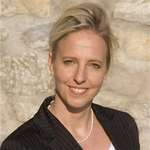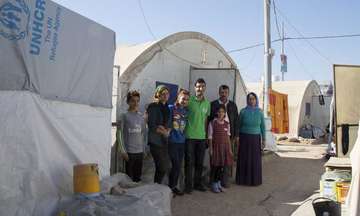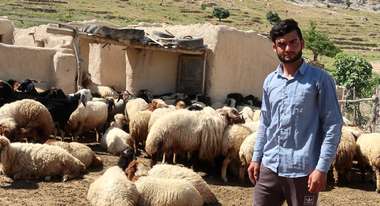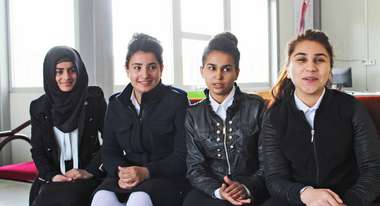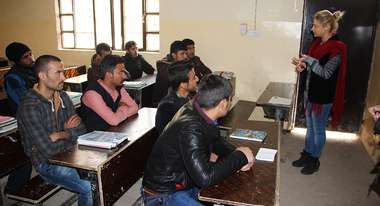"After Lunch We Decided to Leave"
The Islamic State of Iraq and the Levant (ISIL) attacked dozens of villages in Northern Iraq. Imad Haji and his family fled to Bajed Kandala camp. Now he works as a Cash Transfer Officer for Welthungerhilfe.
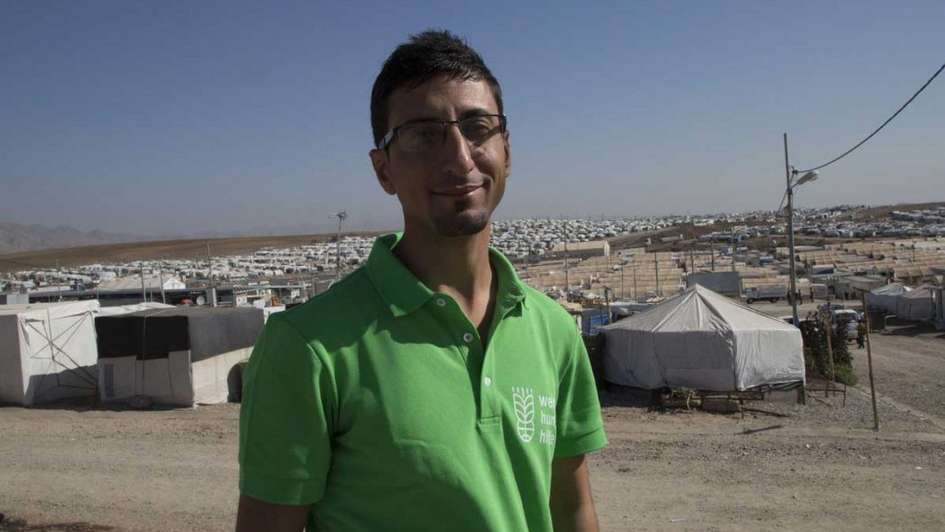
On 3 August 2014, the Islamic State of Iraq and the Levant (ISIL) attacked and seized control of dozens of villages in the Sinjar District of Niniveh region, Northern Iraq. In what the UN later classified as the genocide of Yazidis by ISIL. Thousands of Yazidi women were enslaved and men executed. The genocide has led to 300.000 Yazidi civilians fleeing Sinjar and their ancestral lands in the Niniveh region. In 2016 Welthungerhilfe started one of the largest reconstruction and livelihoods programmes in the liberated areas of the Niniveh.
“Just after lunch on 3 August, we suddenly realized that all our neighbors had left the village, even the Mukhtar*” , says Imad Haji in a low voice. “That’s when we decided to leave.” Imad recalls that in the weeks leading up to their escape all Yazidis were terrified of ISIL and a possible attack. Many of them fled to Turkey. “We were lucky we had our car. Those without cars had to flee by foot onto Sinjar Mountain,” says Imad. With his parents and six siblings, he fled in their old black Opel Vectra and headed North towards Dohuk in the Kurdish Region of Northern Iraq (KRI). “ISIL were coming from Baa’j and Tel Afar in the South-East and from Syria in the West. They stopped us. We explained that the Mukhtar and everybody else had left and we would return in a few days. Then they let us go, saying ‘they are Yazidis, they are good people, let them go’.”
A home for refugees and internally displaced people
80 km further North, in the town of Rabe’a, their car broke down. Imad’s family got lucky again. They were offered a ride on a pick-up truck by strangers coming from Sinjar as well, who brought them to Bajed Kandala camp. The camp near the Turkish-Syrian border was originally built as a transit site for Syrian refugees in 2014. Two years later, it is now home to 12.500 refugees and internally displaced people, mainly Yazidis from Sinjar.
Originally from Dugure village in Sinjar 25-year old Imad Haji has been an employee of Welthungerhilfe in Iraq since October 2016. In his job as Cash Transfer Officer he helps organizing Cash for Work projects for the local population and returning Yazidis throughout his home region of Sinjar. Welthungerhilfe’s Cash for Work activities in this region focus in particular on the rehabilitation of social infrastructure, such as schools, public health facilities, water supply or road networks.
Imad still lives in Bajed Kandala camp with his family. A tent the size of about 40 square meters has been their new home for more than two years. When Imad first came to the camp in August 2014 he started working with children as a volunteer. As a professional mathematics teacher he was soon offered his first job as coordinator of the child friendly space in the camp – a protected space for children which gives them the opportunity to play and learn while being cared for by social workers or volunteers. “Working with children is wonderful,” Imad says, “they make you forget everything.” Through volunteering Imad started his career working with humanitarian NGOs. Before joining Welthungerhilfe he worked with the International Organisation of Migration and the Norwegian Refugee Council.
Imad dreams of getting married and starting a family. However, life in Iraq for Yazidis is shaped by various insecurities. Imad feels like he doesn’t have the luxury of planning his future. In this part of the world political unrest and armed conflicts can change personal plans in a heartbeat. “Iraq is a very difficult place to have children,” Imad says. “At the moment everybody is waiting for the liberation of Mosul and getting rid of ISIL. There were 74 genocides of Yazidis in history so far in this region, how could I raise my children in such an environment? Many Yazidi families are thinking of leaving Iraq.” Nevertheless, Imad believes that as many as 200.000 Yazidis would return to Sinjar in the future if the living situation improves. “A programme like our Cash for Work project is very important,” says Imad. “People here have no money and no work. They are glad about every opportunity that enables them to care for their families again. People just want safety, stability and better living conditions for their children. Without that, nobody can stay here.”
In November 2016 around 3.3 million people are displaced in Iraq. Many fled to escape the terror of ISIL in 2014. During that time basic infrastructure in the communities that were forced to flee was destroyed for the most part. Two years later, livelihoods of the population are still unstable, which means people are unable to care for themselves and their families. On behalf of the German Ministry of Economic Cooperation and Development Welthungerhilfe has started a 2.5 year project in 2016 aiming at improving the livelihoods of returnees and the local population in Western Nineveh Province. Using a multi-level approach, the project focusses on income improvement for vulnerable groups, rehabilitation of infrastructure, social cohesion as well as awareness raising about unexploded remnants of war.
*Head of village or neighborhood in many Arab countries usually chosen through consensual or participatory method, e.g. an election.




